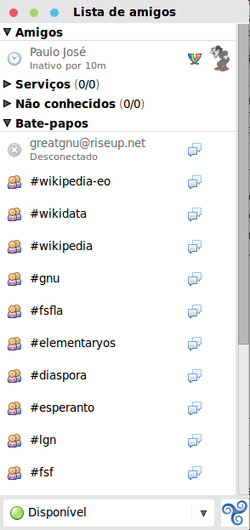Pidgin (software)
 |
|
|
Screenshot

Pidgin's buddy list window in Trisquel
|
|
| Initial release | December 31, 1998 (as Gaim) |
|---|---|
| Stable release | 2.11.0 (June 20, 2016) |
| Preview release | None |
| Repository | bitbucket |
| Written in | C (C#, Perl, Python, Tcl are used for plugins) |
| Platform |
Linux macOS Microsoft Windows |
| Available in | Multiple languages |
| Type | Instant messaging client |
| License | GPL |
| Website | pidgin |
Pidgin (formerly named Gaim) is a free and open-source multi-platform instant messaging client, based on a library named libpurple that has support for many instant messaging , allowing the user to simultaneously log in to various services from one application.
The number of Pidgin users was estimated to be over three million in 2007.
Pidgin is widely used for its Off-the-Record Messaging (OTR) plugin, which offers end-to-end encryption. For this reason it is included in the privacy- and anonymity-focused operating system Tails.
The program was originally written by Mark Spencer, an Auburn University sophomore, as an emulation of AOL's IM program AOL Instant Messenger on Linux using the GTK+ toolkit. The earliest archived release was on December 31, 1998. It was named GAIM (GTK+ AOL Instant Messenger) accordingly. The emulation was not based on reverse engineering, but instead relied on information about the protocol that AOL had published on the web. Development was assisted by some of AOL's technical staff. Support for other IM protocols was added soon thereafter.
As of 6 July 2015[update], Pidgin scored seven out of seven points on the Electronic Frontier Foundation's secure messaging scorecard. They have received points for having communications encrypted in transit, having communications encrypted with keys the providers don't have access to (end-to-end encryption), making it possible for users to independently verify their correspondent's identities, having past communications secure if the keys are stolen (forward secrecy), having their code open to independent review (open source), having their security designs well-documented, and having recent independent security audits.
...
Wikipedia
